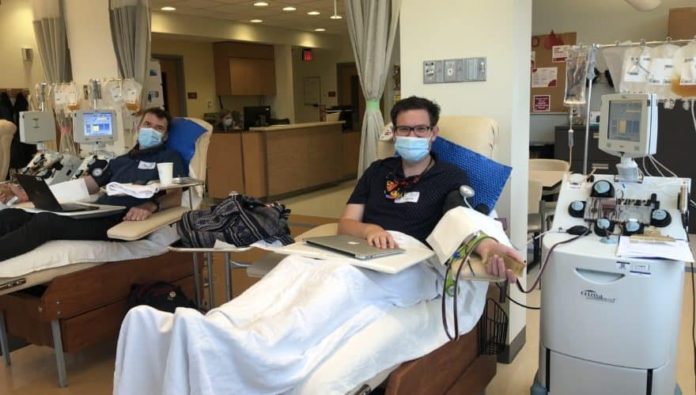
This story first published online at North Carolina Health News.
Lee Storrow was a proud regular platelet donor for years, a service to the community he began after a representative spoke to his biology class at the University of North Carolina at Chapel Hill about the importance of donating.
But Storrow became instantly ineligible when he had sex with a man.
At the time, more than a decade ago, Storrow was immediately barred from donating at all, regardless of how often or when he had had sex. From 1983 until 2015, the FDA recommended blood establishments turn away all men who had had sex with men after 1977. The rule was put in place to prevent the population hardest hit by the AIDS crisis from unknowingly donating blood containing the virus, as it became clear that the blood-borne disease could be spread between men who had sex with one another.
As time went on, blood donations were screened more effectively, and many gay men began to practice safer sex, nonetheless the rule remained in place for decades.
Frustrated about the FDA rules, Storrow went to Washington to testify against them as an openly gay college student. He was the only witness without an academic title next to his name to testify in favor of ending the lifetime ban before a U.S. Department of Health and Human Services Blood Safety and Availability Advisory Committee meeting in June 2010.
“I was like a 20-year-old student and joke that my parents found out I have sex from MSNBC,” Storrow, now in his 30s, said, “which is not how most people expect their parents to find out.”
Over a decade later, he is still advocating for any form of the blood ban to end, as the executive director of North Carolina AIDS Action Network.
The FDA lifetime ban ended in 2015 when it moved to a 12-month deferral period for men who have had sex with men within that time frame. In order to combat a shortage in the blood supply caused by the COVID-19 pandemic, the FDA relaxed restrictions in 2020 to include men who have not had sex with men for three months.
Ironically, the pandemic guidelines made Storrow eligible to donate platelets again for the first time in years, through a combination of the loosening of restrictions and the pandemic limiting his interactions with others.
“I was glad I was able to get back,” Storrow said. “Some of the staff were there from a decade ago, and it was kind of fun to get to see them.”
But as multiple blood banks plead with potential donors to give blood in emergency notices across the country, Storrow can’t help.
He’s ineligible again.
The United Kingdom recently loosened restrictions on gay and bisexual men giving blood, allowing people who have had the same sexual partner for the past three months to donate blood in order to help address a shortage of blood due to the COVID-19 pandemic.
As blood banks across the U.S. offer incentives to potential donors, such as Amazon gift cards, in order to encourage them to help address a “severe blood shortage”, advocates argue for the end of blanket bans for men who have sex with men.
Potential harms
Advocates for people with HIV and AIDS argue that a blanket policy that bans a whole group of people adds to existing stigma.
“This continues to perpetuate the stereotype that the only people who get HIV are men who have sex with men, and that’s simply not true,” said Michael Poandl, development and communications coordinator at the Western North Carolina AIDS Project. “And it also promotes stigma that every man who does have sex with men is virtually HIV positive, simply because of that. And obviously that is not true either.”
HIV affects more than just gay men. While a 2018 CDC study found that 69 percent of new HIV diagnoses were among gay and bisexual men, 24 percent were among heterosexual people and 7 percent were among people who inject drugs.
A woman who is heterosexual who has had multiple sexual partners in the past three months is also at a high risk for STDs, said Kara McGee, a physician assistant at Duke Health who specializes in infectious diseases and is an associate professor at the Duke University School of Nursing.
“Everyone, regardless of gender, is in fact susceptible to HIV,” Poandl said.
The science advances
Since the emergence of the AIDS epidemic in the 1980s, the FDA tightened restrictions on how men who have sex with men give blood, but experts and physicians argue that these restrictions are a vestige of the past.
At the beginning of the AIDS epidemic, there was no test for HIV or AIDS, and scientists weren’t even sure how it was transmitted, said Ayako Miyashita Ochoa, assistant adjunct professor at the University of California Los Angeles Luskin School of Public Affairs.
“The policy itself was a reflection of that,” Miyashita said. “It also obviously targeted specifically the populations that were hardest hit by HIV and AIDS, and so what we find is that over time, with improvement or the advances in the science we see that the policy is lagging.”
A lot has changed since the 1980s, including what we know about HIV transmission, the groups that are predominantly affected by HIV and the efficacy of prevention measures, Miyashita said.
While the policy has changed from a lifetime deferment for men who have had sex with men, its blanket deferment for any gay or bisexual man who has had sex in the past three months excludes men who are in monogamous relationships and doesn’t differentiate between different types of sex, which vary in risk.
The methods of testing the blood supply have also changed, McGee said.
“The methods that are used to screen blood supply now are nearly 100 percent sensitive,” McGee said, “which is very different from the type of testing that they used years ago. And so that really narrows the window period from time of infection to the time the test would turn out positive.”
Looking for a solution
Advocates and scientists calling for an end to the ban don’t believe all gay men should donate or all people should donate blood.
“There are real risks that are associated with not identity, but certain conduct,” said Scott Schoettes, the former HIV project director at Lambda Legal who is also someone with HIV. “And so, the policy, when it changes, will need to continue to address minimizing that.”
Many experts and advocates argue for an individual risk assessment of sexual behavior for all people. This process would not only allow gay and bisexual men who are not at risk for HIV to donate, but it would also screen out other people who are involved in risky behaviors.
This process has been used in Italy since 2001, and there has been no significant impact on the amount of HIV in the population since then.
“While we say that we really can’t compare one country to another because each country has their own processes, protocols and tracking system,” Miyashita said, “I think that it gives us good insight into what we can expect if we do modify our own policies here domestically.”
The FDA ruled out changing its guidelines to an individual risk assessment due to insufficient information on the validity of questions on monogamy and safe sex practices. It has funded the Assessing Donor Variability and News Concepts in Eligibility (ADVANCE) study with Vitalant, OneBlood and the American Red Cross to explore alternatives to the deferral policy for men who have sex with men.
“The study is designed to assess if the questions related to behaviors may be effective in distinguishing between gay and bisexual men who have recently become infected with HIV and those who do not have HIV infection,” said Red Cross spokesman Rodney J. Wilson. “If this pilot study shows promising results, the next step may be a larger study to test these questions.”
Schoettes advocates for a shorter deferral period based on the individual risk assessment.
“The policy has always been designed to address very recent infections that would not show up on such tests,” Schoettes said.
Making the perfect policy is tricky, Storrow said, but the existing one “reinforces these really dated beliefs about gay men and their sexuality.”
“That gay men are dirty, that they’re unclean.”
Addressing the blood crisis
North Carolina is one of many states which currently face a severe blood shortage.
Compared to 2019, the Red Cross has seen demand for red cells from trauma centers grow by 10 percent in 2021, it said in a statement.
The shortage is due to a rise in trauma cases, organ transplants and elective surgeries. People who had waited to have their surgeries until the pandemic improved now need more blood since their diseases progressed while they waited for surgery, and hospitals are seeing more trauma and emergency visits and more overdoses.
“Reducing the deferral for MSM [men who have sex with men] is an important advance in our efforts to achieve a blood donation process that treats all potential donors with equality and respect, and ensures that a safe, sufficient blood supply is readily available for patients in need,” the Red Cross said in a statement.
The Red Cross has updated its screening process to allow men who have not had sex with other men in the past three months to donate. However, donors who were deferred before due to the previous policy for men who have sex with men will have to be evaluated for reinstatement, a process that could take time since it involves many potential donors.
The Blood Connection, an organization with centers in South Carolina, Georgia and North Carolina, has faced “extremely low donor turnout for the past 3 months,” spokeswoman Allie Van Dyke said in a statement.
Due to international regulations it is required to follow, The Blood Connection’s deferral period is four months, but the change in guidelines from the previous 12-month deferral “widens the pool of people who are able to donate blood, which is extremely important right now,” Van Dyke said.
McGee has received messages from Duke asking her to donate blood as the shortage worsens.
“We’re in the middle of a critical blood shortage,” McGee said. “It’s frustrating that we have these sort of blanket bans that keep a lot of people who are willing from donating.”
North Carolina Health News is an independent, non-partisan, not-for-profit, statewide news organization dedicated to covering all things health care in North Carolina.
Support independent local journalism. Join the INDY Press Club to help us keep fearless watchdog reporting and essential arts and culture coverage viable in the Triangle.
Comment on this story at backtalk@indyweek.com.








